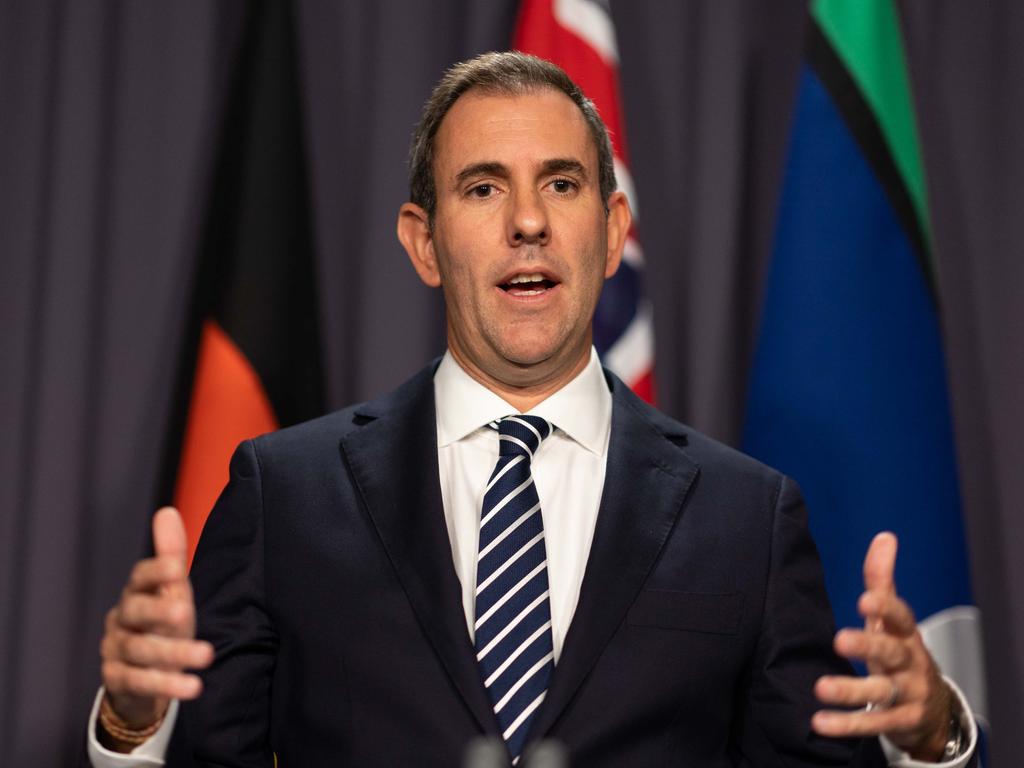‘Don’t force Australians into default funds’: Super bosses’ warning to Jim Chalmers
Top industry, retail super funds unite to warn off the Treasurer as business braces for Labor to shift focus to the $3.5 trillion sector.

Some of the nation’s top industry and retail superannuation funds have united to warn Jim Chalmers to not force people into default retirement products, as business leaders brace for the government to aggressively shift its reform focus to the $3.5 trillion superannuation sector.
After Anthony Albanese pushed through the final tranches of Labor’s union-backed industrial relations laws, superannuation is shaping as the next political battleground, with new polling revealing 87 per cent of voters trust themselves over the government to make their own choice on retirement funds.
Financial services firms fear powerful, union-linked industry super funds will wield enormous influence over Financial Services Minister Stephen Jones and Dr Chalmers, who released a discussion paper in December outlining plans to shake up how people spend their superannuation.
The retirement income discussion paper said super funds should consider “developing ‘default solutions’ to offer to different subclasses of members based on factors such as superannuation balance or expected needs”.

The Financial Services Council, backed by members including AMP, Colonial First State Superannuation and Insignia Financial, on Monday will push back against government plans to impose new rules on the superannuation sector. The Treasurer has flagged roles for government and regulators to “create an environment” that boosts tailored super products and services.
Aware Super chief executive Deanne Stewart, leader of one of the country’s largest industry funds with more than a million members, said a “personal” choice and “individual” approach trumped “one size fits all”.
“What Australians want for themselves in their retirement is really personal and varies significantly according to their individual circumstances,” she said.
“This outcome (the polling) certainly matches with the research we’ve done with Aware Super members that stresses how important it is for them to get the right help and guidance to make the right choice for themselves, rather than a one-size-fits-all approach.”
AMP Limited chief executive Alexis George warned “standardised default retirement products are not the answer to helping Australians get the most out of their savings for the simple reason that retirement needs are not standard”.
“Australia’s ageing population requires a combination of improved member education programs from their super funds, greater diversity and choice in lifetime income solutions and, importantly, access to more affordable financial advice,” Ms George told The Australian.
“The government should continue to implement policies which support innovation across these areas, including rapid implementation of the Quality of Advice Review recommendations.”

FSC chief executive Blake Briggs, representing a sector that manages more than $3 trillion in funds for 15.6 million Australians, said Dr Chalmers must be “careful not to default superannuation consumers into government-designed retirement products”.
“Australians overwhelmingly support making their own financial decisions at retirement, with the support of affordable financial advice. There is significant risk for the government if they were to try and convince Australians that politicians know best determining which retirement products they should use,” Mr Briggs said.
The warnings come as CT Group polling of more than 2500 voters, commissioned by the FSC, found 87 per cent of Australians trust themselves more than the government to make decisions about retirement products.
The poll, conducted between January 22 and February 1, revealed 70 per cent of working-age voters trust themselves rather than their super fund to choose retirement products and 73 per cent trust their super fund instead of the government. At retirement age, 76 per cent are likely to seek advice on their retirement products, with 62 per cent relying on their financial adviser, 46 per cent on their super fund and 14 per cent on the government.
The analysis, showing Australians want the government to prioritise ensuring funds generate competitive investment returns, found only 31 per cent support the government’s proposed default retirement product.

Dr Chalmers, who gave stakeholders two months to respond to Treasury’s Retirement Phase of Superannuation discussion paper, said “the problem is most retirees do not have access to the appropriate products to help them maximise their super over their lifetime”.
After releasing the discussion paper on December 4, he said “84 per cent of retirement savings are held in account-based or allocated pensions, with only 3.5 per cent held in annuities. Unlike account-based pensions, annuities offer the option of receiving regular payments for life, regardless of how long a person lives”.
A spokesman for Dr Chalmers said the government was looking how to “improve” the superannuation retirement phase so the system “delivers a better retirement for more Australians”.
“While there is an appreciation of super’s importance in saving for the future, there’s been less attention given to how super can actually deliver in retirement,” he said.
“The consultation paper we released seeks community and industry views on how the system can best provide the security and income Australians need in retirement,” he said.
Government sources said Labor has no predetermined approach and the Treasury’s consultation paper notes “individual circumstances are different, and there is no one-size-fits-all approach”.
Colonial First State Superannuation chief executive Kelly Power said “everyone’s circumstances are different”.
“In fact, most people don’t get to choose when they retire,” Ms Power said. “That’s why planning for retirement early, getting advice and having flexibility are so important. At CFS, having helped more than 3 million Australians save for retirement, we know those who receive advice are far better prepared and far more confident in retirement.
“A default retirement product simply won’t cater to the individual circumstances members face in retirement and risks even further disengagement with their super.”
Insignia Financial chief executive Renato Mota said “we believe increasing the accessibility and affordability of advice will allow Australians to make more informed decisions at a critical life stage … we encourage the government to prioritise implementing its response to the Quality of Advice Review”.
AustralianSuper, the nation’s biggest fund, proposed in its submission that Australians have an “account for life”. Under the proposal, accumulation and retirement accounts would be combined into a single superannuation “account for life”.

Mr Briggs told The Australian “consumers’ preference for control over their retirement savings is a cautionary warning to superannuation funds that are considering whether to impose ‘one-size-fits-all’ solutions on to members at retirement”.
Industry sources suggested an “account for life” is “another way of forcing mandatory default because if you combine accumulation and pension then you lock-in the award defaults that the unions control”.







To join the conversation, please log in. Don't have an account? Register
Join the conversation, you are commenting as Logout